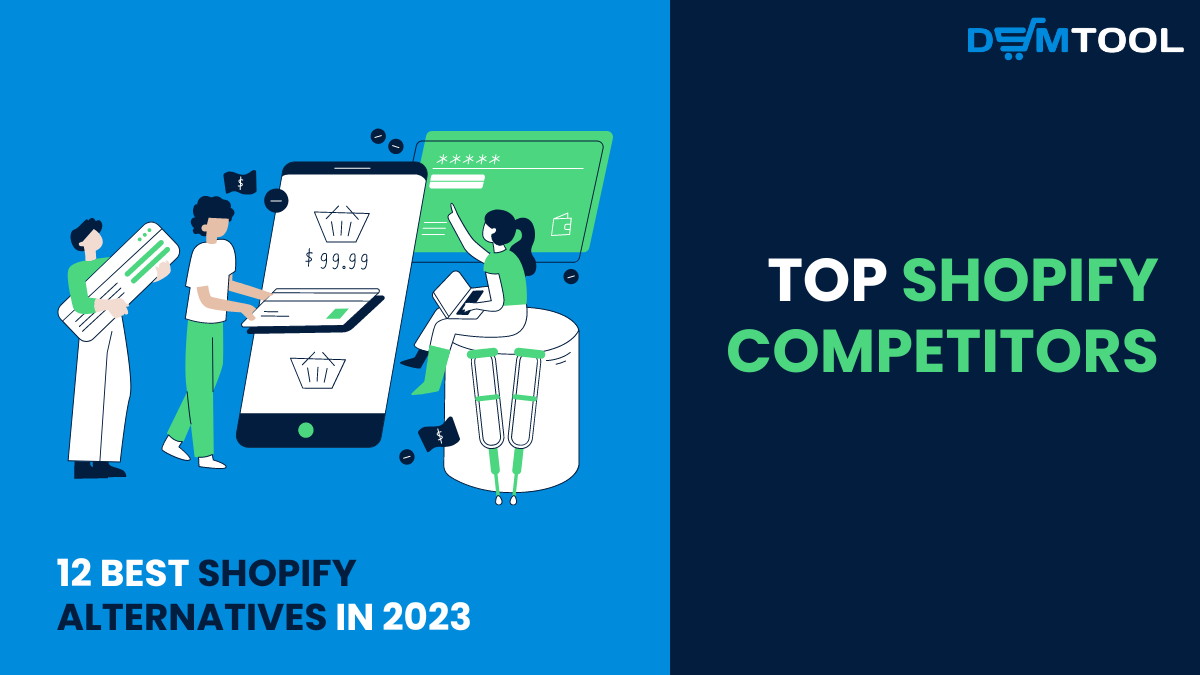
As eCommerce continues to grow, many businesses look for robust and reliable online store platforms to help them reach their target audiences and increase their revenues. Shopify is one of the most well-known eCommerce platforms, but it may not be the best fit for every business. Are there good Shopify alternatives? Yes, fortunately, there are several Shopify competitors available that offer similar features and functionalities.
In this article, we’ll review the top Shopify alternatives in 2023, highlighting the unique features and benefits of each competitor of Shopify to help you choose the best eCommerce platform for your business.
Why Choosing The Right eCommerce Platform Matters
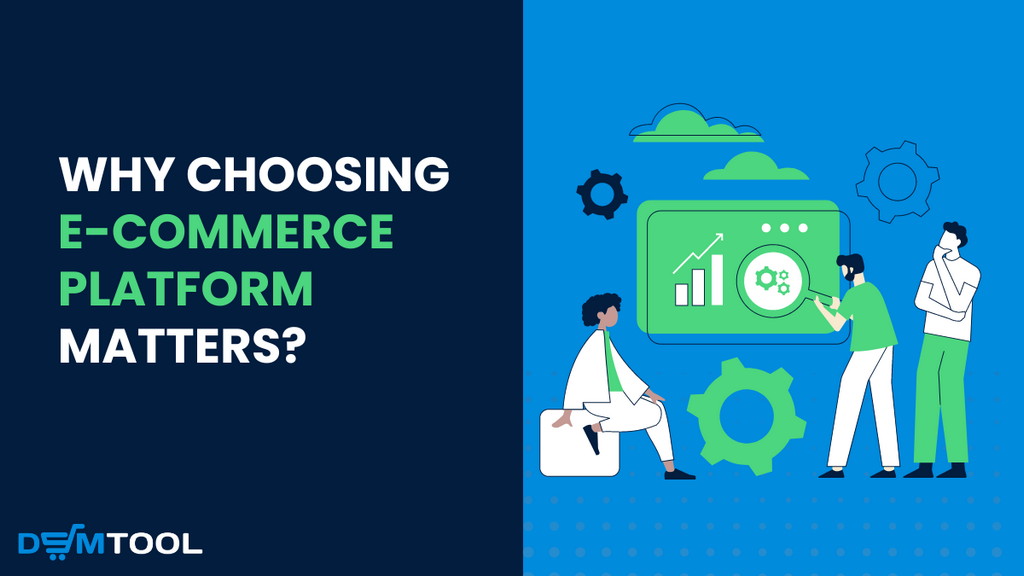
Choosing a good platform to open an online store is vital for any business to succeed in eCommerce. It allows online stores to reach wider audiences, sell products and services online 24/7, and manage their operations more efficiently. The choice of an e-commerce platform is critical as it can directly affect the success of your online venture.
User experience is one of the first factors you should consider because it can impact sales significantly. A user-friendly platform with an intuitive interface can enhance the customer’s experience, increasing customer satisfaction and loyalty. It can result in more repeat business and increased revenue.
A good e-commerce platform provides the tools for businesses to manage their online operations efficiently. These tools include inventory management, marketing tools, payment gateways, and analytics. By streamlining these processes, sellers can save time and money and focus on growing their business.
Another key benefit of selecting the right eCommerce platform is security. A secure platform provides customers the confidence they need to make online purchases, protecting your business and your customers’ data. It can also help to improve your brand reputation and customer trust.
Scalability is another important factor to consider: you need a platform that can grow with your business without the need for significant changes that disrupt sales. The platform must handle increased traffic, sales, and load spikes during busy seasons without compromising performance or user experience.
As you can see, choosing the right e-commerce platform is crucial for online success. A well-chosen platform can improve the user experience, streamline business operations, enhance security, and provide scalability for future growth.
Shopify is widely considered one of the best eCommerce platforms. So why should you look for Shopify alternatives? Why do businesses turn to Shopify competitors?
Why Look For A Shopify Alternative?
If you are considering launching an online store, you want the best options for your business. And while Shopify is a popular and powerful eCommerce platform, it’s not the only one in the market. Even more, some users switch from Shopify after running a store for some time. 34% of 5 million Shopify customers last a full year on the platform, with the average store lasting just 143 days, according to the analysis from The Globe and Mail.
There are several reasons why you might need a Shopify alternative. Here are some of the most common reasons businesses switch to Shopify competitors.
Costs
The cost of running an online store is a significant factor to consider. This is especially true for dropshipping, which is a low-margin business. Shopify offers several pricing plans, ranging from $32 to $399 per month. While this might seem reasonable, they can add up quickly, especially when running a high-volume store. Additionally, if you’re using Shopify Payments, you’ll have to pay a transaction fee of 2.9% + 30 cents per transaction. You can reduce this fee by using a third-party payment gateway, but it can still add up to a considerable amount over time.
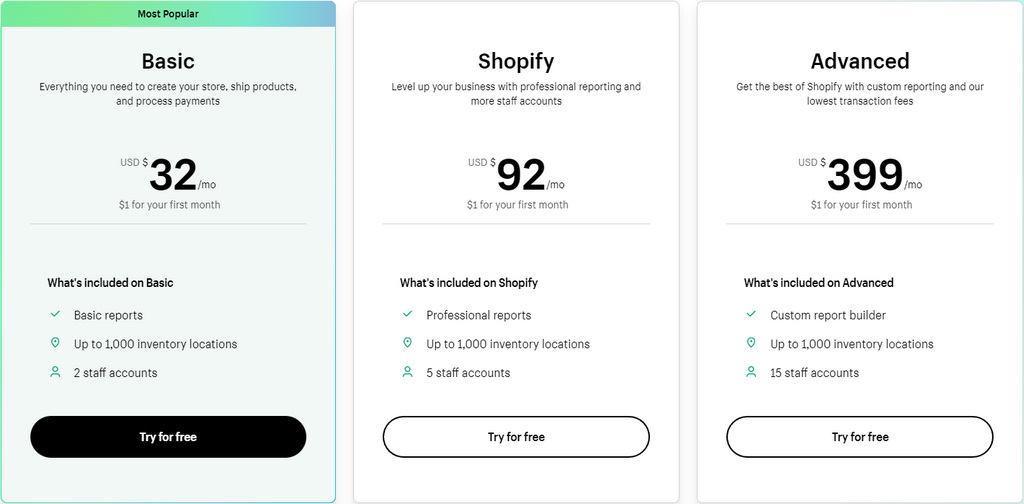
On top of the platform’s costs, there are also third-party apps. While plenty of free plugins are available, most of the best Shopify apps are paid. Then why use these apps? Well, while Shopify provides all the necessary eCommerce features, you might need more advanced functionality as your store grows. According to Shopify, over 80% of retailers on the platform use third-party apps, with more than 25.8 million apps installed. And each of these apps will add up to the monthly costs. You can easily reach $200+ monthly expenses even with the cheapest Shopify plan.
Many businesses find that they can save money by switching to a more affordable platform. For example, some eCommerce platforms offer cheaper plans, while others have lower fees for processing payments.
Features
Shopify is a powerful and flexible eCommerce platform. And while it provides all the necessary tools and features for businesses to manage their online stores, you might find that Shopify competitors offer more advanced or specific features that can better serve your business.
For example, alternatives to Shopify offer advanced marketing tools such as personalized product recommendations, email marketing automation, and social media integration. With such features, sellers can attract new audiences and engage with customers more effectively, which leads to increased sales and revenue.
Other Shopify alternatives might offer more advanced inventory management features, such as multi-warehouse management, automated stock-level alerts, and customizable purchase orders. These features help streamline supply chain management and avoid costly stockouts or overstocks.
Some Shopify competitors offer more robust customization and branding options, such as customizable checkout pages, themes, and templates. It is especially vital for businesses that want to establish their brand and create a unique and personalized shopping experience for their customers.
In addition, some Shopify competitors offer more advanced reporting and analytics tools, allowing tracking and analyzing key metrics such as customer behavior, sales trends, and website traffic. These insights can help make informed decisions and optimize online stores for maximum performance.
Of course, sellers can improve existing Shopify features and bring new functionalities with third-party apps, but it costs money. Each plugin adds up to the monthly costs, as we previously discussed.
When it comes to eCommerce features, one must consider their business’s unique needs and requirements. While Shopify offers all the needed tools and features, its competitors might offer more advanced tools or specific features that better serve one’s business.
Customization
Customization is another important consideration when choosing an e-commerce platform. And while Shopify offers over a hundred themes, allowing businesses to create a professional-looking online store quickly and easily, you may find that Shopify competitors offer more advanced personalization options.
Let’s start with the fact that most Shopify themes are paid. As of the time of writing, there are 121 paid and 12 free themes available in the Shopify themes store. It is not critical, but Wix, for example, offers over 800 hundred templates, and all are free.

Some Shopify alternatives offer more advanced theme customization options, allowing you to create a truly unique and personalized shopping experience for your customers. These platforms may allow you to customize the checkout process, product pages, and other aspects of your online store to align with your brand’s unique identity.
In addition, some Shopify competitors offer more advanced design and development tools, allowing the creation of custom functionalities, features, and integrations that further enhance online stores’ performance and functionality. It can be vital for businesses with complex requirements, such as those that need to integrate with custom third-party systems or offer advanced product personalization features, like branded dropshipping.
Furthermore, some Shopify alternatives provide more advanced mobile responsiveness and customization options, allowing businesses to create mobile-optimized stores with a seamless shopping experience across all devices. With more customers shopping on their mobile devices, having a responsive and customizable mobile store can be a decisive competitive advantage.
Shopify offers basic customization options, but some businesses may require more flexibility and advanced customization features to create a truly unique and personalized online store. Consider your needs and goals, and compare the customization options offered by different e-commerce platforms to find the best Shopify alternative that meets your requirements and allows you to create a truly customized shopping experience for your customers.
Scalability
Scalability is also important. You want a platform that grows and adapts to your business’s growth without disruptions and significant technical manipulations. While Shopify is known for its scalability, some users may require more advanced or flexible scaling options. The reason is that Shopify is a SaaS platform with everything related to tech handled by them. While this is good for usual users without tech skills and small stores because they don’t have to hire developers, bigger businesses might find this limiting.
One example is multi-store management. When running multiple online stores, you may want to manage all of them from a single dashboard, which is convenient. Some Shopify alternatives offer more advanced multi-store management capabilities, allowing you to easily manage multiple stores, products, and customers in one place.
Another scalability feature that some Shopify competitors offer is the ability to handle high traffic and big sales volumes. While Shopify handles significant traffic and sales well, businesses with high-volume sales or rapid growth may require more advanced scaling options. Some Shopify alternatives offer more advanced load balancing and caching capabilities, allowing them to handle large spikes in traffic without affecting site performance or user experience.
In addition, some Shopify competitors have more advanced API integrations, enabling you to connect with more third-party tools and services. It can be crucial for businesses that require more advanced integrations or custom development work to scale their online stores.
As you can see, scalability may be a decisive factor for some businesses. While Shopify offers robust scalability features, some may require more advanced or flexible scaling options to support their growth over time. By considering your business’s specific scaling requirements and evaluating the scalability options offered by different e-commerce platforms, you can find the best Shopify alternative that meets your business’s needs and can support your growth over time.
Integration
Another influential aspect of any e-commerce platform is integration – the ability to connect with other third-party applications and services. Because Shopify is one of the most popular eCommerce platforms, with 20% of stores running on it, most third-party integrations support it. Still, some businesses may require more advanced or flexible integration options than Shopify offers.
One example is payment gateways. While Shopify supports a wide range of payment gateways, some businesses may require more advanced payment gateway options or more flexible payment processing options to meet their specific needs. Some Shopify alternatives offer more advanced payment gateway integrations and customizable payment processing options, allowing businesses to process payments more efficiently and securely.
Another integration feature that some Shopify alternatives offer is more advanced inventory management capabilities. Businesses with complex inventory management requirements, such as managing multiple warehouses, tracking serial numbers, or managing stock levels for multiple sales channels, may require an e-commerce platform with more advanced inventory management features. Some Shopify competitors offer more advanced inventory management capabilities, including support for multiple warehouses, batch and serial number tracking, and inventory forecasting.
Some Shopify alternatives offer more advanced integrations with shipping carriers and fulfillment services. You may require an e-commerce platform that offers more advanced shipping and fulfillment options if you ship products internationally or use multiple shipping carriers. Top shopify competitors offer more advanced shipping and fulfillment integrations, including support for multiple shipping carriers, real-time shipping rate calculations, and automated fulfillment workflows.
Overall, Shopify offers a wide range of integrations. But this is because of its popularity, not the merit of the platform itself. And some businesses may require more advanced or flexible integration options to meet their specific needs.
Support
Support determines the level of assistance and guidance you can expect to receive as you use the platform. And good support is crucial. While Shopify offers a range of support options, including 24/7 phone and email support, some businesses may require more advanced or personalized support options.
Dedicated account management is one example. You may require a dedicated account manager who can provide ongoing assistance if you have complex requirements or need personalized guidance. Some Shopify alternatives offer dedicated account management services, allowing you to work with a single point of contact who can help you navigate the platform and address any issues or concerns.
Another beneficial support feature that some Shopify competitors offer is a more extensive knowledge base and online community. Online resources like tutorials, FAQs, and user forums are crucial if you want to learn more about the platform you are using and find ways to gain a competitive edge. Some Shopify alternatives have more comprehensive knowledge bases and online communities, making finding answers to common questions and connecting with other users for insights and best practices easier.
Some Shopify competitors offer more advanced onboarding options and training, which is useful if you have a team or need to onboard new users to your eCommerce platform. These programs can be customized to ensure your team has all the necessary skills and knowledge to use the platform effectively.
Overall, Shopify provides good enough support for most businesses. But if you require more advanced or personalized support options, you might want to look for Shopify alternatives.
Top Shopify Competitors
Now that we reviewed the most common reasons businesses look for Shopify alternatives, let’s review the top Shopify competitors.
1. WooCommerce – One Of The Best Free Shopify Alternatives

WooCommerce is a popular e-commerce platform often considered the main alternative to Shopify. Flexibility and customizability are the main reasons people choose WooCommerce over Shopify.
WooCommerce is a WordPress plugin that turns WordPress websites into fully functional eCommerce stores. With WooCommerce, you have complete control over your online store design and functionality, unlike with Shopify. You can customize your store in any way you want – if you have the required technical skills or access to a developer.
Another advantage of WooCommerce is its affordability. The plugin is free, and you only need to pay for hosting, a domain name, and any premium extensions or themes you want to use. It can be significantly cheaper than Shopify, especially for small businesses or those just starting out. This is one of the best free Shopify alternatives.
WooCommerce also provides a wide range of features and integrations. The plugin has built-in payment gateways, shipping options, tax calculations, and more. And you can extend the functionality of your store even further with thousands of third-party plugins and themes available. It makes WooCommerce a powerful platform for businesses of all sizes.
One potential downside of using WooCommerce is that it requires more technical knowledge than Shopify. While plenty of online resources are available to help you get started, you need to be comfortable using WordPress and potentially working with code. It can be a barrier for some businesses who prefer more user-friendly platforms.
Overall, WooCommerce is a robust alternative to Shopify for businesses looking for more flexibility and customizability in their e-commerce platform. With its affordability, wide range of features and huge developer community, it is a popular choice for small and large businesses alike.
2. BigCommerce – Shopify Best Alternative
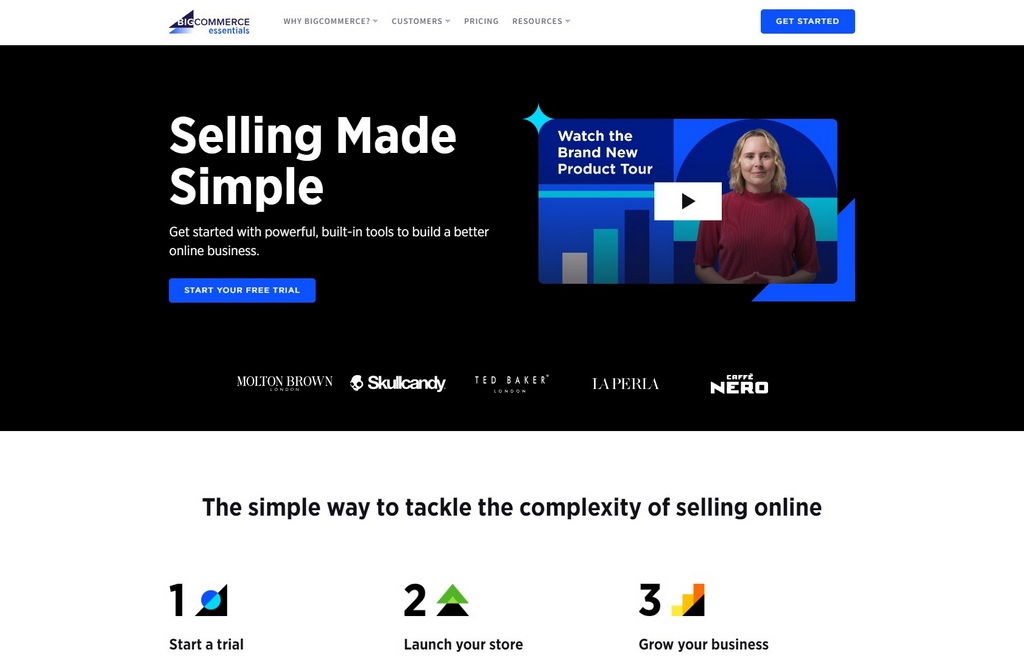
BigCommerce is one of the most popular alternatives to Shopify for businesses looking for a robust and scalable eCommerce platform. One of the main reasons why users switch from Shopify to BigCommerce is its advanced features and flexibility.
BigCommerce is known for its powerful built-in features, including a comprehensive product management system, customizable checkout pages, and real-time shipping and tax calculations. It is an excellent choice for businesses that need more advanced e-commerce functionality and want to avoid relying on third-party plugins or apps, which is one of main Shopify’s drawbacks.
Another advantage of BigCommerce over Shopify is its scalability. While Shopify is a solid platform for small and medium-sized businesses, it becomes considerably more expensive and limited as your business grows. With BigCommerce, however, you can scale your online store as much as you need without worrying about additional costs or technical limitations.
BigCommerce also offers a wide range of integrations, which make connecting with other business tools and software simple. This includes popular platforms like Amazon, eBay, and Facebook and accounting and shipping software like QuickBooks and ShipStation.
Finally, BigCommerce offers a higher level of support and assistance than Shopify. Users have access to a dedicated account manager who can provide ongoing guidance and help as they navigate the platform.
Additionally, BigCommerce offers a comprehensive knowledge base, community forums, and 24/7 support via phone, email, or chat.
Overall, BigCommerce is a powerful and flexible alternative to Shopify – it offers advanced features, scalability, and excellent support. Businesses looking for a more robust e-commerce platform with advanced functionality and customization options should definitely consider BigCommerce as the Shopify best alternative.
3. Wix eCommerce – Best Templates

Wix is another popular Shopify alternative that provides users with an accessible website builder that integrates e-commerce functionality. Users appreciate the platform’s simplicity, affordability, and customization options, making it an excellent choice for those looking to switch from Shopify.
One of Wix’s best benefits over Shopify is its user-friendly website builder. With Wix Ecommerce, creating and customizing an online store is effortless, even if you have no coding skills or technical expertise. The platform is known for its fantastic drag-and-drop editor, a wide range of design options, and provides over 800 free customizable templates. All this makes it accessible to most users creating an attractive, professional-looking website that reflects your brand’s unique style.
Moreover, Wix is more affordable than Shopify. With three Wix eCommerce plans, the platform caters to businesses of all sizes and budgets. Shopify’s pricing plans can become expensive, especially as your business grows. However, Wix offers more affordable pricing plans while providing powerful e-commerce features.
Furthermore, Wix offers advanced customization and branding options, such as advanced product pages, social media integrations, and email marketing tools. You can create a personalized shopping experience for your customers, increasing engagement and driving sales.
Finally, Wix provides excellent customer support, including a knowledge base, community forums, and 24/7 help via phone, email, or chat. This feature can be especially beneficial for businesses that require ongoing guidance and support when setting up and managing their online store.
Considering all the advantages, Wix eCommerce is an excellent Shopify alternative for sellers looking for a user-friendly, customizable, and affordable online store platform. With its intuitive website builder, robust e-commerce features, affordable pricing, and exceptional support, Wix eCommerce is an excellent option for businesses looking to start selling products online.
4. Squarespace – The Most Sophisticated Shopify Competitor

Squarespace is another popular Shopify competitor. It is a sophisticated, design-focused website builder that integrates e-commerce features. Many sellers choose Squarespace because of its user-friendly drag-and-drop website builder, customizable templates, and creative flexibility.
One of the main benefits of using Squarespace over Shopify is how easy it is to use – you can easily drag and drop elements on your website. Squarespace offers some of the most beautiful templates that are highly customizable. This means you have more creative freedom to create a website that reflects your brand’s unique style.
What really sets Squarespace apart is its focus on design and creative flexibility. They offer a range of customizable templates, many of which are designed with a minimalist aesthetic that lets your products shine. With Squarespace, you can create a professional, sophisticated online store that stands out, even if you don’t have much experience building websites. It is a perfect Shopify alternative for businesses that sell visually-driven products, like fashion or home decor.
Another great thing about Squarespace is that it offers more affordable pricing options than Shopify. They have lower-priced plans accessible to businesses of all sizes and budgets.
Squarespace offers robust e-commerce features such as inventory management, payment processing, and shipping integration. By managing everything in one place, businesses can streamline their selling process and save time.
With its intuitive website builder, customizable templates, and robust e-commerce functionality, Squarespace is a great Shopify alternative for businesses that value ease of use, affordability, and creative flexibility.
5. Magento Open Source – For Large-Scale Businesses
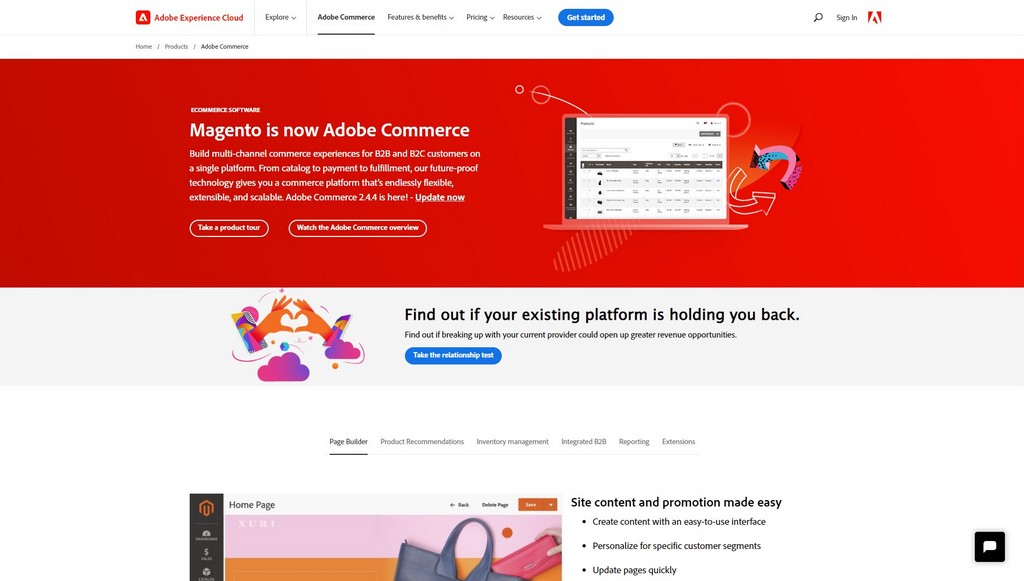
Here is one of the best free Shopify alternatives. Magento Open Source is a popular e-commerce platform that provides a feature-rich experience for businesses looking to sell online on a large scale. It is a highly customizable and scalable open-source platform and an extremely powerful competitor to Shopify.
There are two versions of Magento: Magento Open Source – an open-source self-hosted version, and Adobe Commerce (Adobe purchased Magento Commerce) – a cloud-based SaaS solution. Magento Open Source is free, but you need a professional developer to create a store. Adobe Commerce is more like Shopify but is far more advanced and pricey.
One of the primary reasons businesses switch from Shopify to Magento Open Source is the flexibility and control it offers over the design and functionality of their online store. Magento users have access to a wide range of customizable themes, templates, and an extensive library of extensions and add-ons, allowing them to build a store tailored to their specific business requirements.
Scalability is another strong point of Magento. It is a highly scalable eCommerce platform that can handle large amounts of traffic and transactions without slowing down or crashing. Magento is an excellent option for businesses experiencing rapid growth and need a platform that can keep up with their expanding requirements without disruptions.
Also, Magento provides some of the most advanced eCommerce SEO features, making it easier for sellers to optimize their online stores for search engines and drive more organic traffic to their websites. It also offers multi-language and multi-currency support, so it is an ideal solution for businesses operating in multiple countries and regions.
Magento is unique in that it is a highly flexible and customizable eCommerce platform businesses can tailor to their specific needs. It is a great Shopify alternative for sellers looking for more control over their online store’s design and functionality and need a platform that can grow and evolve with their business. By leveraging this Shopify alternative, skilled and certified Magento developers can effectively address the specific needs of sellers.
6. Ecwid – Perfect For Existing Websites

Ecwid is a popular e-commerce platform offering a unique selling point to sellers looking for a Shopify alternative. The platform focuses on small businesses looking for a simple and easy-to-use eCommerce solution that is also affordable.
One of the main reasons why users switch from Shopify to Ecwid is the platform’s flexibility. Ecwid integrates seamlessly with different website builders, like WordPress, Wix, Weebly, and more. Ecwid is an excellent option for businesses looking to add an online store to their existing website without the hassle of switching to a new platform. It is a significant advantage because changing platforms can be a daunting and expensive experience.
In addition, Ecwid offers a range of advanced features, such as abandoned cart recovery, real-time shipping rates, and multi-channel selling. These features help businesses to increase sales and improve their overall e-commerce strategy.
Ecwid is also known for its excellent customer support. The platform provides a range of help options, including email support, live chat, and phone support. In addition, Ecwid has a large community of users who are always ready to help each other out.
Another unique aspect of Ecwid is its pricing. The platform offers a free plan that allows users to set up a basic online store with up to 10 products. For sellers needing more advanced eCommerce features, Ecwid offers a range of paid plans with significantly lower prices than Shopify.
Ecwid is a flexible, affordable, and easy-to-use eCommerce platform ideal for small businesses. It is a perfect option to start selling online without having to switch platforms. With its wide range of integrations, advanced features, and excellent customer support, Ecwid is a strong Shopify competitor for businesses considering their options.
7. Shift4Shop – A Powerful Affordable Shopify Competitor

Shift4Shop is a powerful and affordable Shopify alternative that boasts a broad range of features, catering to both small and large businesses. One of the primary reasons why users switch from Shopify to Shift4Shop is its comprehensive suite of tools, including a point-of-sale system, email marketing, and a blog. Additionally, Shift4Shop offers unlimited product listings and bandwidth, making it an excellent choice for businesses looking to scale up.
Another reason why users choose Shift4Shop is its robust customization options. With Shift4Shop, users can modify the HTML and CSS code to create a unique and personalized storefront. The platform also offers a drag-and-drop website builder that simplifies website creation, even for those without coding experience.
What makes Shift4Shop unique is that it offers a free plan with all the essential features, such as unlimited products, storage, and bandwidth. This makes it an ideal choice for businesses starting out on a tight budget. The platform also offers paid plans that provide access to additional features, including advanced SEO tools, abandoned cart recovery, and integration with popular payment gateways.
Another unique aspect of Shift4Shop is its emphasis on security. The platform uses advanced security features, including 256-bit SSL encryption, fraud protection, and PCI compliance to ensure user data is protected from potential threats.
In conclusion, Shift4Shop may be the right choice if you are looking for an affordable, feature-rich, and highly customizable alternative to Shopify. With its broad range of tools, emphasis on security, and generous free plan, it is a strong Shopify competitor for businesses of all sizes.
8. Volusion – A Popular Shopify Competitor

Volusion is a cloud-based e-commerce platform that gains popularity as a Shopify competitor. It offers all the necessary eCommerce features and tools for businesses to build, manage, and grow online stores.
Volusion’s affordable pricing plans is one of the main reasons why users choose it over Shopify. Volusion doesn’t charge transaction fees like Shopify, making it a more cost-effective solution for small and medium-sized businesses.
With Volusion’s wide range of customization options, businesses are able to create unique and engaging storefronts. The platform’s drag-and-drop website builder enables users to easily create and customize their online store’s design without needing coding skills. Additionally, Volusion provides an extensive selection of themes and templates, including mobile-responsive designs, to help sellers create a professional-looking online store without much effort.
Scalability is another strong point of Volusion. The platform offers a range of tools and features that enable businesses to grow their online store as their needs evolve. For example, Volusion supports multi-channel selling, allowing merchants to sell on popular marketplaces like Amazon, eBay, and Facebook. Additionally, its advanced inventory management system can handle large product catalogs, making it an ideal solution for businesses with high volumes of SKUs, like dropshipping stores.
One unique feature of Volusion is its “Success Team,” which provides users with personalized support and guidance. A dedicated team of experts can assist customers with everything from design and development to marketing and SEO. This level of support is a key reason why users switch from Shopify to Volusion because businesses get the help they need to succeed online.
Volusion is a powerful eCommerce platform with a plethora of features and tools, making it a compelling Shopify alternative. Its affordability, flexibility, scalability, and personalized support make Volusion a go-to option for small and medium-sized businesses aiming to create, manage, and expand their online stores.
9. PrestaShop – Free Shopify Alternatives
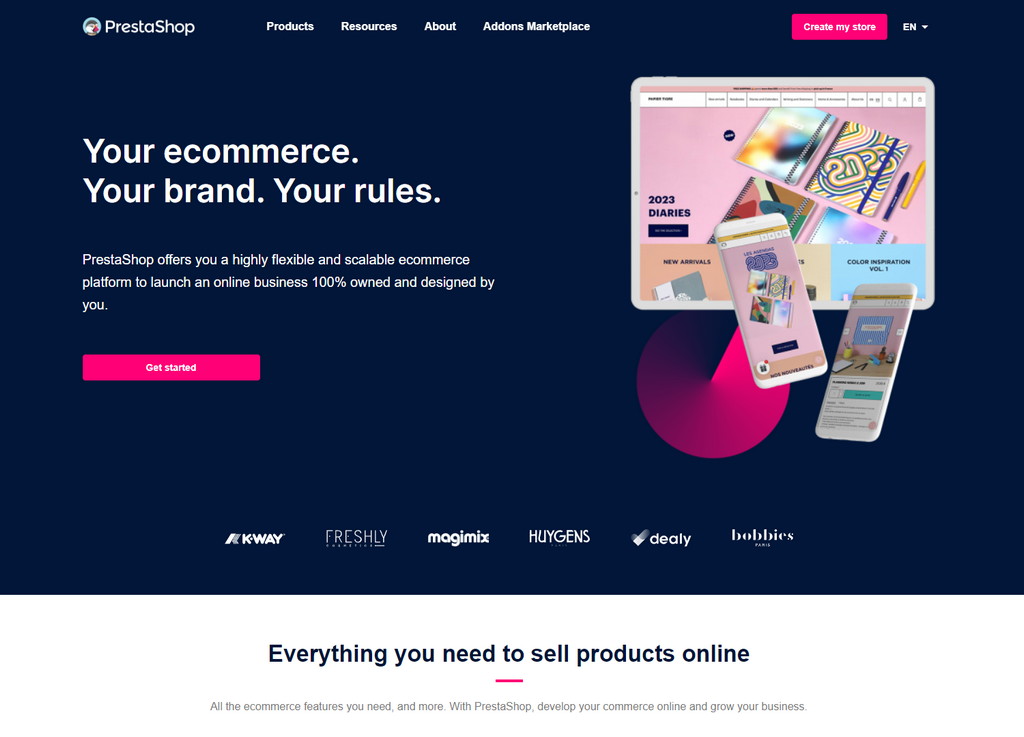
PrestaShop is a popular open-source e-commerce platform that has gained attention as a Shopify competitor. Some sellers switch from Shopify to PrestaShop for its unique features and capabilities. One of the main reasons why users prefer PrestaShop is its flexibility and customization options. With a wide range of themes, plugins, and integrations, PrestaShop allows sellers to create a unique online store that reflects their brand and caters to their specific needs.
Another reason why users prefer PrestaShop over Shopify is its pricing. PrestaShop is a free and open-source platform, meaning sellers can download and use the software without monthly subscription fees. However, users must pay for web hosting and additional features, such as premium themes or plugins. Nevertheless, PrestaShop’s pricing model can be a more affordable option for small businesses or those on a tight budget.
PrestaShop is also known for its multilingual capabilities, which make it an ideal choice for sellers targeting an international market. With support for over 75 languages, PrestaShop allows sellers to create a localized shopping experience for customers around the globe. Also, PrestaShop offers a range of payment and shipping options, making it easy for sellers to cater to their customers’ preferences.
PrestaShop is a robust e-commerce platform that offers a range of features and capabilities that can make it an appealing Shopify alternative. With its flexibility, affordability, and multilingual capabilities, PrestaShop is a great choice for sellers looking to create a unique and customized online store that caters to their specific needs.
10. Sellfy – Shopify Alternative For Digital Sellers
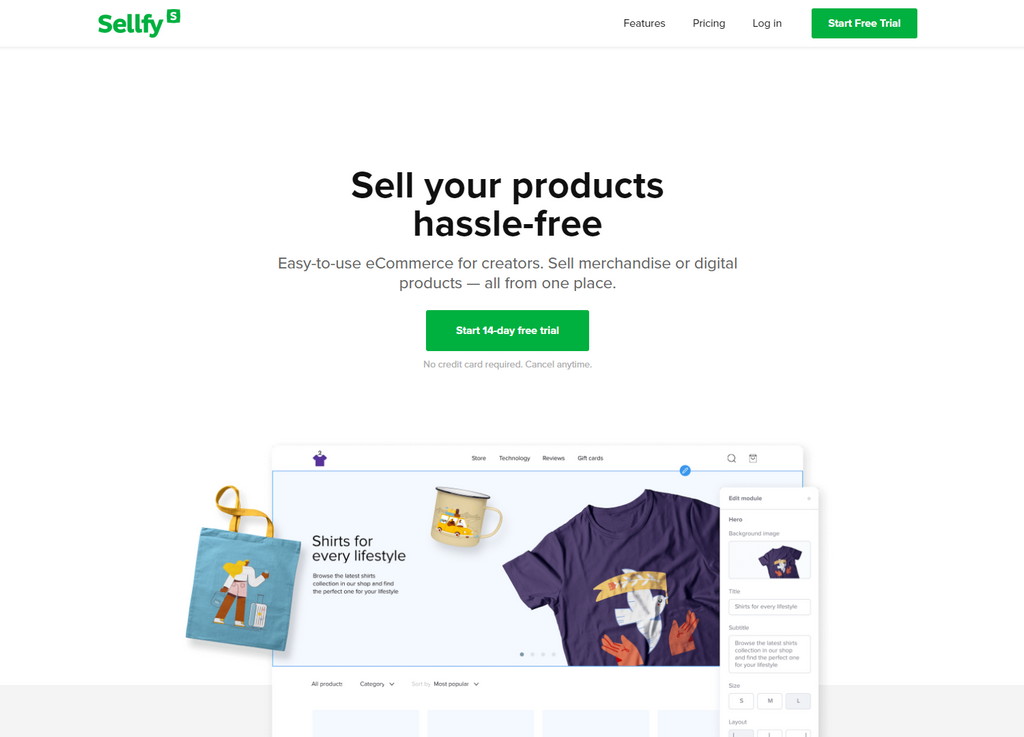
Sellfy positions itself as an effortless e-commerce platform designed specifically for creators, artists, and digital entrepreneurs looking to sell digital (e-books, music, and video content), physical, subscription, and print-on-demand products.
The main reason businesses switch from Shopify to Sellfy is that it offers a simple and easy-to-use platform for selling digital goods. With Sellfy, users can set up their store quickly and easily and start selling their products in just a few clicks.
Its focus on digital products is Sellfy’s unique selling point, which sets it apart from other Shopify competitors in the list that cater to merchants selling physical products. Its advanced features, such as product upsells, customizable checkout pages, and a built-in affiliate program, make Sellfy’ a powerful store platform for digital entrepreneurs.
Another advantage of Sellfy is its pricing structure, which is more affordable than Shopify. It offers a free plan for users who sell up to five physical or print-on-demand products. Businesses selling digital and subscription products need a paid subscription that costs as low as $19 per month when billed annually for two years.
Sellfy also provides excellent customer support, with a dedicated support team available 24/7 to assist users with any questions or issues they might face. Such help is vital for creators and digital entrepreneurs who may not have the technical skills or resources to manage their online stores and need personalized guidance.
Overall, Sellfy is a great option for those looking to sell digital products and wanting a more affordable and easy-to-use Shopify alternative.
11. Square Online – A Viable Shopify Alternative

Square Online is another popular e-commerce platform considered a viable Shopify alternative. It offers an easy-to-use interface and a variety of features that make it a good choice for small and medium-sized businesses.
Its pricing structure is one of the main reasons why users switch from Shopify to Square Online. While Shopify charges transaction fees on top of subscription costs, Square Online does not charge any transaction fees, making it a more affordable option for sellers just starting out.
Square Online provides a range of eCommerce features and tools, like inventory management, order management, and shipping integrations. It also has a built-in POS system, which is convenient for businesses also running physical stores.
Another unique feature of Square Online that makes it stand out from the rest of Shopify competitors is its integration with other Square products, such as Square Payments and Square Appointments. This integration can be advantageous for businesses already using these products as it allows them to manage their entire business operations from one platform.
Square Online also provides a variety of templates and design options that allow businesses to create a unique and professional-looking online store. Additionally, its responsive design ensures the store will look great on all devices, like desktops, tablets, and smartphones.
One potential downside of Square Online is that it is not as scalable as other eCommerce platforms. Large businesses that require more advanced features and customization options should consider other Shopify alternatives.
If you are looking for an affordable, easy-to-use eCommerce platform, Square Online is definitely worth considering. The integration with other Square products and lack of transaction fees makes it an attractive Shopify competitor for small and medium-sized businesses.
12. OpenCart – Free Shopify Alternatives
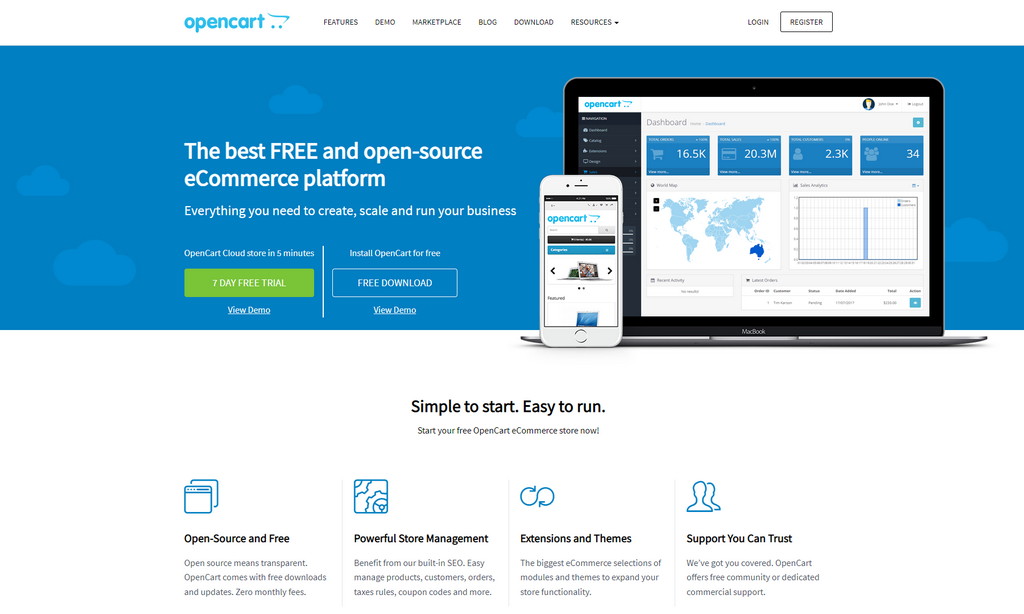
OpenCart is another open-source eCommerce platform that offers multiple features and customization options, making it a popular Shopify alternative.
One of the reasons users switch to OpenCart from Shopify is the flexibility it has. With OpenCart, businesses have full control over their website’s design and functionality and can customize everything to their liking and requirements.
Another reason businesses switch to OpenCart is the cost: it is a free and open-source platform – you don’t have to pay for licenses or monthly fees for using it. OpenCart is a cost-effective eCommerce platform for businesses and startups that have limited budgets.
One of OpenCart’s best features is its multi-store support that allows creating and managing multiple stores from a single dashboard. It is extremely useful if you have multiple brands or product lines you want to sell online. Additionally, OpenCart offers a wide range of extensions and plugins, allowing you to improve existing and integrate additional features and functionality to your store as your business grows.
Another reason users choose OpenCart is the community of developers and users. OpenCart has a vast and active community of developers who create new themes, plugins, and extensions and provide extensive support to users. You can get the help and advice you need promptly and can always discover new ways to enhance your online store.
To sum up, OpenCart is a great Shopify alternative if you need a cost-effective, customizable, and flexible eCommerce platform. With its multi-store support, active community, and range of features and extensions, it offers a lot of value to online store owners. OpenCart is a strong Shopify competitor that gives users full control over their online store.
Shopify Competitor Analysis
Selecting the best Shopify alternative for your eCommerce business requires careful consideration of your specific needs, budget, and goals. Assessing your business needs, evaluating features and functionality, checking integration options, considering the level of support, and reading reviews can help you make an informed decision.
Here is a short summary of the Shopify competitors we discussed:
- WooCommerce is a great choice for businesses that need a lot of flexibility and control over their online store and are comfortable with technical aspects like setting up hosting and maintaining a website.
- BigCommerce offers robust features and scalability, making it a good choice for fast-growing businesses or those with complex needs.
- Wix eCommerce provides an all-in-one solution with an intuitive drag-and-drop website builder, making it easy for businesses to create a professional-looking online store.
- Squarespace is another all-in-one solution with beautiful templates and advanced customization options. It is particularly well-suited for businesses that want a visually stunning online store.
- Magento Open Source offers advanced customization and flexibility, making it a popular choice for businesses with complex needs or large product catalogs.
- Ecwid is an easy-to-use platform that can be integrated with existing websites or social media pages, making it a good choice for businesses that want to add an online store to their existing web presence.
- Shift4Shop offers a range of advanced features like marketing automation and inventory management, making it a good choice for businesses looking for an all-in-one eCommerce platform.
- Volusion is a user-friendly platform with powerful customization options, making it a good choice for businesses that want a high degree of control over their online store.
- PrestaShop is a customizable, open-source platform that’s particularly well-suited for businesses that want to sell in multiple languages or currencies.
- Sellfy is a simple, straightforward platform ideal for businesses that sell digital products like eBooks or courses.
- Square Online is an all-in-one platform, especially well-suited for businesses that already use Square for payment processing, with seamless integration between payment processing and online store features.
- OpenCart is a free, customizable, and flexible open-source eCommerce platform. It is a good choice for businesses that want to keep costs low while still having control over their online store.
You can also check our article the List of Best eCommerce Platforms for Dropshipping for a more in-depth analysis of the best eCommerce platforms.
Conclusion
Shopify is one of the most popular eCommerce platforms, but popular doesn’t mean the best. There are many reasons why businesses turn to Shopify competitors: from cost and customization to scalability, integration, support, and features.
When considering Shopify alternatives, it is essential to asset your business’s unique needs and requirements. By thoroughly considering this list, you can find a platform that fits your business the most and can help achieve your eCommerce goals.

